Imran Khan and PTI: Great Show but there are some Lessons to Learn – by A Z
Imran Khan is an immensely popular personality in Pakistan – perhaps the most popular. He is widely trusted by the people and his persistent political struggle against the odds has earned him a great deal of respect by most people. In the last elections his party has emerged as the second largest party in the country, bagging about 18% of the national vote. They have also won enough seats to forge a provincial government in KPK. The only way to move from here should be forward. However, as PTI rejoices in its success, it is also time for some introspection and observation to rake in a few lessons. Here are some of the things it needs to understand or do to be able to build on its success.
PENETRATE PUNJAB: Despite its ability to galvanize masses, PTI’s inability to connect with an average Punjabi has, in the final analysis, cost it the election. Punjab accounts for 60% of the electorate and about 55% (148 out of 272) of the seats in the National Assembly. Plus the adjoining Hindko speaking area of KPK (with another 5 seats) also traditionally votes with northern Punjab. Hence this is where the elections will always be mainly decided.
That PTI has obtained 19% votes in Punjab should be viewed highly positively as a thumping start in the most populous province of the country. That it lost elections should not dishearten it. No serious minded analyst (including some less serious minded ones like this scribe) expected it to emerge as the single largest party in the national assembly. Nawaz Sharif was always expected to win these elections by fully leveraging his image as an average Punjabi’s poster-boy: rich and yet countrified and extremely successful and yet a good Muslim. Sharifs are poised to continue getting a large chunk of the votes in Punjab. The two brothers form a good combination, one is respected for his zeal and industry and the other is genuinely liked by the Punjabis. PMLN got 49% votes in Punjab as compared to 29% in 2008, mainly reclaiming its voters from PMLQ and thriving on younger Sharif’s government’s relatively solid performance in the province.
Thus this is where PTI’s main challenge lies. As someone with reasonably spread tentacles in Punjab, I can say with full conviction that while Khan’s scathing personal attacks on Nawaz Sharif may have stirred his most passionate supporters, they did not ring well with most people in the streets, bazaars, and villages. Deprecation with a touch of humour goes down much better with Punjabis, for instance.
From here PTI should look to increase its vote bank in Punjab to 30-35%. While it has already captured the imagination of literate urban Punjabis, for the next few years it must work very hard to reach out to the Punjabis in towns and villages.
PERSONAL APPEAL IS IMPORTANT BUT NOT ENOUGH: The greatest asset of PTI is that Imran Khan is probably the most popular and trusted political leader in the country. A party leader’s personal image is essential in the subcontinent’s parliamentary elections. PPP clearly suffered in these elections for not having a popular personal leadership at its helm. However, personal popularity just affords a head start and what matters in the end is the ability back up personal appeal with hardnosed political sense and toil. PTI must inspire its supporters to get off the social media and toil in the streets and neighbourhoods. Realpolitik is different. The point below further builds on this theme.
PLAY BY THE ESSENCE OF ELECTORAL POLITICS: While presidential elections represent one big match, parliamentary elections are the sum of numerous small matches around the entire territory. Most people in a constituency, especially in rural areas in Punjab, support a candidate –who they consider to be the best for their constituency for diverse reasons even though they may consider the leader of another party as the best choice at the national level- regardless of the party and form the core support of the candidate. Usually two main candidates from any area present themselves for election on rival party tickets and the party that manages to appeal to the neutral voters wins. Ability of a candidate to mobilize voters to actually cast their votes also counts a lot. For example, despite such hard-fought electoral battles across the province, independent candidates still bagged more than 13% of the votes cast in Punjab and won 11% of the seats. So in parliamentary elections in developing countries the team brand means nothing unless you have the match winners. The battle is fought not in ‘jalsas’ but constituency by constituency, ‘jalsas’ just add fervour and tempo to the campaign.
For example, seven of the PTI’s candidates won out of 148 in Punjab. These are Imran Khan, Shah Mehmood, Javed Hashmi, Raaey Hassan Nawaz, Shafqat Mehmood, Ghulam Sarwar Khan and Dr Amjad -plus one may add Sheikh Rashid–, all known names and ‘electables’. The party needs to involve more politicians and rely less on technocrats, who instead will be of more help once the party ascends to power.
Participation in the electoral process in 2013 has equipped the party with thousands of passionate workers and has also shaped a vote bank for the party. I trust this will help Imran learn the difference between boycotting and being a part of the electoral process. In fact, if Imran Khan had not boycotted the elections in 2008, PTI would have done much better in these last elections. PPP and MQM have also learnt the same lesson in the past at great cost to those parties.
SHOW PERFORMANCE: It is a great opportunity for PTI to make its mark as a model of good governance in KPK and as the advocate of national conscience in Islamabad. (In the other three provincial assemblies its presence is too insignificant to bear much consequence.) Instead of getting carried away by the success in KPK, it must remember that this is a province in serious turmoil that has elected a new party to govern itself in each of the five previous elections. This speaks for the enormity of the challenge and opportunity both, as success in KPK will be greatly palpable and will be highly regarded by the populace across the country.
At the national level, PTI must come across as a vigilant opposition, constantly on the alert and guarding the public interest, without appearing as overly confrontational. Nawaz Sharif’s innate tendency to become arbitrary and autocratic will provide PTI with enough opportunities to score points on his person. PTI can also excel in demonstrating its quality in the legislative parleys by adding value and insight to the law-making process. Now that PTI will be the active and visible opposition, it will also have the opportunity to educate its countrymen on their active participation in public affairs. It is well placed to capitalize on the enhanced awareness.
WATCH YOUR IMAGE: The truth is that Pakistan is a chauvinistic society and PTI has to be careful to not become branded as a party of urbanites, especially in Punjab. Given the heat of disappointment in the wake of the recent elections, some of its members have been indiscrete to foster this image and thus have played into the hands of their wily opponents like PMLN and MQM, which have pounced on the opportunity to inculcate a perception that PTI’s burgher supporters view the rest of Pakistan’s wisdom to vote with disdain. It is good that Khan himself has behaved with restraint and maturity.
INSTIL RESTRAINT IN YOUR SUPPORTERS: An average PTI supporter cannot be carved in the image of Imran Khan, with a right to interminably fulminate and pontificate. He/She must learn to be more humble and respectful of others’ opinions and their right to like or follow other leaders. The very essence of democracy is dissent and debate.
POSTSCRIPT: I also felt tempted to discuss a few lessons that the PPP can probably learn but then I realized that Mr Zardari knows it all and needs no advice. However, the figures below show that both the PPP and the MQM are losing ground in Sind, thus debunking their claims about their victory as a vote of confidence for their provincial government.
Previous articles on the subject: https://lubpak.com/archives/263187
https://lubpak.com/archives/262123

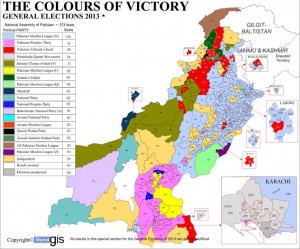
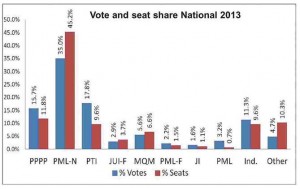
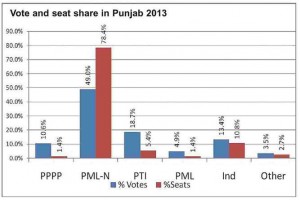
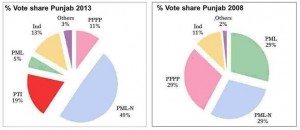
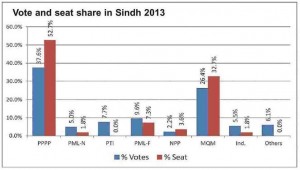
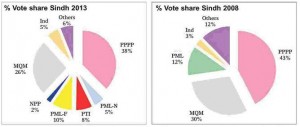
No one wants to admit that PTI’s majority in KPK has a clear ethnic logic behind it. Moreover, PPP will be the main opposition party as PTI will eventually join PMLN in a loose alliance.
It was stupid to have intra-party elections just before the elections. All the energy and money was wasted on internal battles without having enough time to recoup.
PTI’s supporters should stop walloping in self-pity that Imran’s partway solemn challenge –lent sensation by his very unfortunate fall- to Nawaz Sharif did not succeed. That Khan had the wicket suited to play his shots freely and yet could not finish the match does not matter anymore, he must learn his lessons and live to fight another day.
Instead we should spare a thought to the parties and politicians who were killed, maimed, and cruelly thwarted from being equal participants in the democratic process.
And we should think of the future, just as the Pakistan Army must be mulling how best to woo back its runaway bride – Mian Nawaz Sharif.
Whosoever is creating class divide is doing a disservice to Pakistan. We can’t afford another schism. MQM, PMLN, and those PTI supporters who brag their congregations as confluences of literate people are all wrong. Trust this now clear. This is politics my friend and PTI should not create a situation that its opponents can use to its advantage. So your point was never lost. I agree with it.
I fully agree that for quite some time we shall be depending on the ‘electable’ in the majority of the constituencies of Pakistan to win the elections but while selecting them we can go for lesser evils .
یہی موقع ھے تحریک انصاف کیلئے اگر وہ
کرپشن میں نمبر ون خیبر کو کرپشن سے پاک کردے
عدل و انصاف قائم کرنے سے امن و امان خود قائم ہوتا ھے
نہ کہ کالی پیلی ٹیکسیوں یا لال نیلے تندوروں یا لیپ ٹاپوں سے
I have read so many articles on the topic of the blogger lovers however this paragraph is genuinely a fastidious paragraph, keep it up.
ティソ
Imran Khan and PTI: Great Show but there are some Lessons to Learn – by A Z
wwfjyriii http://www.gb3fut5nmi82z2867x06r8zj3c5lr948s.org/
[url=http://www.gb3fut5nmi82z2867x06r8zj3c5lr948s.org/]uwwfjyriii[/url]
awwfjyriii
パネライ 腕時計
銀座 プラダの建築,スマホケース プラダ,プラダ ポーチ ハワイ
シャネル ジュコントラスト 64 くちこみ,シャネル カタカナ ロゴ tシャツ,韓国土産シャネル
are air jordan air max fusion shoes made by nike,air max fusion luxury motors downers grove,nike air max 95 dynamic flywire azul
ドルチェ& ガッバーナ 下着,ドルチェアンドガッバーナ2015秋冬,dolce&gabbana サンダル コピー
ケイトスペード がま口財布,ケイトスペード iphone5 待受,ケイトスペード ウエストバレー
カルティエ 財布 メンズ パシャ 評判,cartier made in china,カルティエくぎブレスレット偽物
ボッテガヴェネタ 財布 レディース 人気 色,ショルダーバッグ コピー ボッテガヴェネタ,bottega veneta:ボッテガヴェネタ ラウンドジップ
air max valve model 4v310 08 silverado Canada,air max 97 1 wash fm 97.1 christmas music Canada,nike air max 1 liberty print su Canada
kate spade wkru2008 口コミ,ケイトスペード財布口コミ,ケイトスペード偽物見分け方
コーチアレクサンダー,coach 財布 サフィアーノ 名古屋,ハワイ コーチ ブログ
ブルガリベルト取扱店舗,ブルガリカタログ,ブルガリ タオル 引き出物
プラダ ダリア スカート,プラダ サフィアーノポーチ,キーリング 岡山 プラダ
nike air max tn 1999,air max 2014 originales,air max 1 3.26 ebay
フェンディブランド,名刺入れ フェンディ,フェンディ ピーカーブ コピー
ドルチェアンドガッバーナ 財布,picodolce チョコ,ドルチェ&ガッパーナ 2014awコンセプト
air max australia fires pictures of roses,air max australia gun laws 2013,air max australia 5 dollar bill
エルメス ガーデンパーティー風バック,エルメス ノマード 評価,エルメスふうバングル
エルメス ケリー,ガーデンパーティハンドショルダーエルメス,ブランド 通販 アクセサリー シャネル エルメス
ポシェット財布 gucci,グッチシマ ショルダー 223666,グッチ 財布 ラブリー 通販
激安 ヴィトン トワレポーチ,ルイヴィトン 財布 コピー 楽天,ルイヴィトン サマーセーター
fendi トゥージュール 財布,fendi ヴィンテージ,フェンディ 種類
台湾免税店シャネル,シャネル シォルダーバッグ トラベル,シャネル 財布 赤 カメリア
ボッテガヴェネタ偽物見分け,財布 ボッテガヴェネタ 口コミ,ボッテガヴェネタ 偽
ミュウミュウデニムバック 偽物,ミュウミュウ ローファー,ミュウミュウ 千葉
celine パンプス ベージュ,セリーヌ ファントム リネン,セリーヌ トリオ 2014
プラダ レディース ベルト,プラダパロディバック,プラダカナパ芸能人
air max atmos,nike air max air,nike air max classic textile
サングラス シーバイクロエ レディース,クロエの香 ボディーソープ,クロエ ポーチ通販
トリーバーチ ブルー&ホワイト ボーダー,トリーバーチ 大阪 限定,トリーバーチ ロゴ 意味
プラダ デニム バッグ コピー,プラダ キー クマ,prada オルチデア ピンク
nike air max classic bw white gold,nike air max red blue white,air max one ioffer
カルティエ サントス ベルト交換,名古屋 カルティエ ボールペン,カルティエ サントス ドゥモワゼル ダイヤ
銀座店 フェンディ,フェンディ買いました,fendi トゥージュール 財布
ドルチェ アウトレット,ドルチェアンドガッバーナチャングンソク,ドルチェアンドガッバーナ 手帳
gucciロゴマークピアス,グッチシマ 札入れ,gucci 120 269981
コーチ 日傘 ノベルティ,コーチ ダンプラー,コーチ刺繍バック
コロナ ゴールド ブルガリ 価格,ブルガリのシャワージェル 百貨店,ブルガリ ブライダルギフト
miumiu風 ビジュークラッチ,ミュウミュウ クロコダイル リボン 財布,miumiu 財布 クロコ がま口
フェンディ 店舗,バレッタ フェンディ,フェンディスーツ 女性
エルメス バーキン 購入 ブログ,エルメス ボラボラ ポーチ,エルメス ベビーシューズ 浦和
ルイヴィトン シューズバッグ メンズ,ネイル 夏 ヴィトン,ルイヴィトン財布スパーコピー
ディオール アイフォン5 ケース,ディオール スカーフ 買取,ディオールリップ 562
fejk czy oryginał opinie,air max 1 premium red,nike air max męskie
air max girls 49ers apparel san francisco,air max shoes pop art history,nike air max 90 2013 release dates
neue nike air max,nike air max 90 infrared hyperfuse 2012,nike air max 90 grau schwarz rot
バーバリーバッグ_463,バーバリーワンピースキッズ,バーバリー ネクタイ ラッピング
プラダ メガネ 値段,プラダ カモフラ バッグ コピー,プラダ メンズ安い財布
中古ディオールバック,ポートフォリオ ディオール,dior レディース
価格シャネル チェーンウォレット,マニキュア chanel 人気 品番,シャネル マトラッセ ミラー付ポーチ
ケイトスペード iphone 手帳,ケイトスペード マザーバック 使い心地,pcケース ケイトスペード 11インチ
革スマホケース コーチ,12747 コーチ,コーチバックブリーカー2014
ヴィトン六本木ヒルズイニシャルのサービス,ルイヴィトン バッグ アズール 限定 2012,ルイヴィトン 鞄 香港と日本 どちらが安いか
シルク 福助 バーバリー,バーバリーボストンバッグホームページ,バーバリーブラックレーベル オンライン ネクタイ
ドルチェアンドガッバーナ サングラス ピンク,ドルチェアンドガッパーナマーク,ドルチェアンドガッパーナ 長財布 青
where to buy nike air max 2013,nike air max 13 grape juice,air max plus mens
ダンヒルライター取り扱い店,ダンヒル キャンバス ショルダーバッグ,ダンヒル 30代 スーツ
ブルガリ アルミニウム バンド交換,ブルガリ ポシェット デニム,ブルガリ ピアス 正規
エルメスバック ガーデンパーティー オレンジ,結婚祝い エルメス 小物入れ,エルメス ガダルキヴィール ティーc/s
dior 高級スーツ,ディオール風ドレス,ディオール ハンカチ
miumiu 二つ折り財布 輸入,ミュウミュウ 猫柄,りんかミュウミュウ
フリー/FREE RUN 2.0
フェンディの偽物の見分け方,フェンディ オンラインショップ,フェンディー 斜めがけ
札幌駅 ダンヒル,ダンヒル 財布 携帯も入る,ダンヒル 革ジャン
ブルガリ 財布 小銭入れなし,ブルガリ 長財布 札入れ,ブルガリ チョコレート 札幌
アイフォン5s ケースプラダ,プラダ 財布 カラフル,プラダ 手帳 レディース
定期入れ ディオール,dior 年齢,ディオール ピアス 紗栄子
ugg モカシン 激安,ugg 神戸 販売店,ケアンズugg手袋
バーバリー キーケース ペア,バーバリー 財布 秋冬,バーバリー カバン 蓋
トリーバーチ 二つ折り 長財布,ビーチサンダル トリーバーチ コーデ,トリーバーチ 髙島屋 すりっぽん
バーバリー 黒ドレス,バーバリー 白ブラウス,バーバリー メンズカバン グレー
air max australia fires pictures of roses,air max australia gun laws 2013,air max australia 5 dollar bill
coach財布メンズアウトレット ブルー,コーチヘリテージストライプ,財布 コーチ 三田
スーツ ダンヒル アウトレット,ダンヒルロゴ,仙台 三越 メンズ 財布 ダンヒル
激安クロエ 財布,クロエ エテル 通販 本物,財布 クロエ リリィ
ディオール チェーン レザー トート,dior ボディパウダー,女性 メガネ dior
gucci 無地 ショルダーバッグ ジャッキー,グッチ 268917 定価,gucciの携帯カバー
リュック louis vuitton,ヴィトン タイガ 長財布 買取,ヴィトンちゃっく2
クロエ エンゲージリング,クロエ マルチカラー,クロエベブリエの動画
ディアマン レジェ ドゥ カルティエpg,レディース カルティエ 革,カルティエ バロンブルー 38ミリ
ボッテガヴェネタ 財布 アウトレット,京都 ボッテガヴェネタ,ハワイ ボッテガヴェネタ
discount nike air max 1,custom nike air max shoes,wmns air max 1 nd lib
fendi 直営店 財布,フェンディ プチトゥージュール,フェンディ ナイロン エコバッグ
chanel ポーチ 売る,chanel バッグ スポーツライン,シャネル イヤリング 大阪
プラダ 神戸三田,プラダ ハワイアン,prada japan 大阪 求人
ブランドウエア ドルチェアンドガッパーナ,ドルチェ&ガッバーナ ロゴt,ドルチェアンドガッバーナ 広告
パーテーション
ケイトスペード バッグ ミントグリーン,ケイトスペード チェーンバッグ,ケイトスペード アウトレット 韓国
韓国 スカーフ大判 ヴィトン,ルイヴィトンのピンクレザーの長財布,フロリダ免税ヴィトン
ディオール 財布 新作,ディオール サングラス エクセル,dior 東京 求人
エルメス ヴィジョン,hermes クラフト,エルメス ガーデンパーティ 現地価格
ugg 迷彩,ugg 現地,ugg ダコタモカシン コーディネート
ブルガリ 大きいサイズリング,ブルガリ イタリア 財布 安い,イタリアブルガリホテル
トリーバーチ バイカラー 名刺ケース,トリーバーチ 赤 ピアス ハート,トリーバーチ スタッズ
シャネル ラムスキン ポーチ コピー,シャネル 斜めかけウォレット 白,シャネルトートカンボン
フェンディ靴 サイズ,フェンディ財布,fendi イニシャル
レディディオール 素材,ディオール グアム,ディオール 煙草ケース
藤崎 グッチ 手入れ,gucci ホワイト レザー 財布 口コミ,グッチ キノコ バッグ
ラブチャリティー カルティエ,カルティエ財布キーケースセット,カルティエ バースデー リング
ドルチェ&ガッバーナ iphoon,ドルチェアンド カゴバッグ,ドルチェ エメラルド ネックレス
セリーヌ パンプス 新作,セリーヌスクエアラゲージ ベッソ,セリーヌ バッグ ブログ
ダンヒル コインケース 人気,ダンヒルライター 偽物 見分け,ダンヒル 財布買取王国
ケイトスペード ジュエリーケース,ケイトスペード アウトレット iphone5,ケイトスペード バッグ 竹
ヴィトン セカンドバック値段,ルイヴィトン モノグラム スマホ手帳ケース,ルイヴィトン ジッピーウォレット 製造番号 場所
エルメス リンディ ルビー,エルメス バッグ ??? リサイクル,エルメスグリペール、ピコタン
ボッテガヴェネタクロコ財布,芸能人 ボッテガヴェネタ,ボッテガヴェネタ 新作バック
ダンヒル 財布が1番安い店はどこ,ダンヒル 財布 買う,ダンヒル ベルト 評判
air max opis,air max 90 forum,buty nike model
ブルガリ 店舗 天神,ブルガリ ネックレス ブログ,ブルガリ 小銭入れ 大阪店
ベーシュ ダークレッド カナパ プラダ,プラダ カナパ スタッズ,プラダ 財布 サフィアーノ オークション 相場
フェンディ ブレスレッド,フェンディ セレリア ピーカブー 免税店価格,フェンディ モンスターtシャツ
ドイツ クロエ 値段 ケース,クロエ 財布 黒 内側 ピンク,下着クロエ価格
I was looking over the internet for some information since yesterday night and I at last found what i was looking for! This is a wonderful website by the way, although it seems a little bit off place on my smart phone.
Sac Longchamp Beige Pas Cher
Hey compaero, realmente tenido gusto este poste. Can t parece conseguirlo para dar formato a la derecha en Internet Explorer, se dobla todo para arriba, pero no trabaja muy bien en Firefox tan ninguna preocupacin.
Ray Ban Collection
Decorative mirrors is just as its name implies, is for the ladies do street, tie-in dress have equipped with act the role of article, lens general with light color series maintenance, generally for pale pink, this type of glasses easier collocation summer clothing. Sales, said sales member special use mirror also called polarize, mainly for the beach, mountaineering wait for outdoor activities.
Spot on with this write-up, I really assume this web site wants rather more consideration. I’ll probably be again to learn much more, thanks for that info.
Ray Ban Aviator For Pilot
I was searching the net looking for some cool stuff and stummbled accross your site. I wanted to let you know that I think your site has some good pages and that I have already saved this page so I can visit again soon Thanks!
Ray Ban Rx 5226 Eye
Bus Simulator 2015 mods att fsmodding.org (2 posts to this anchor) (http://www.fsmodding.org) game Woorld Tour is extremely pleasurable driving bus
you open following levels, you wll view fantastic environments.
Market Professionals: Your want to work with a company that in touch with thhe eve
before transforming buffalo seo companyenvironment.
Oakley Sunglasses have always played a defining role in the evolution of eyewear. The company also manages to stay in the news with contributions to society and great sunglass designs. Cheap Oakley sunglasses also filter out 100% of all the harmful UV rays of the sun. Oakley sunglasses lenses block 100% of all UVA, UVB, UVC and harmful blue light. Meanwhile, the clarity will not be affected at all. Another innovation rests with strict tests of Oakley sunglasses. Before being marketed, Oakley glasses must pass two tests.